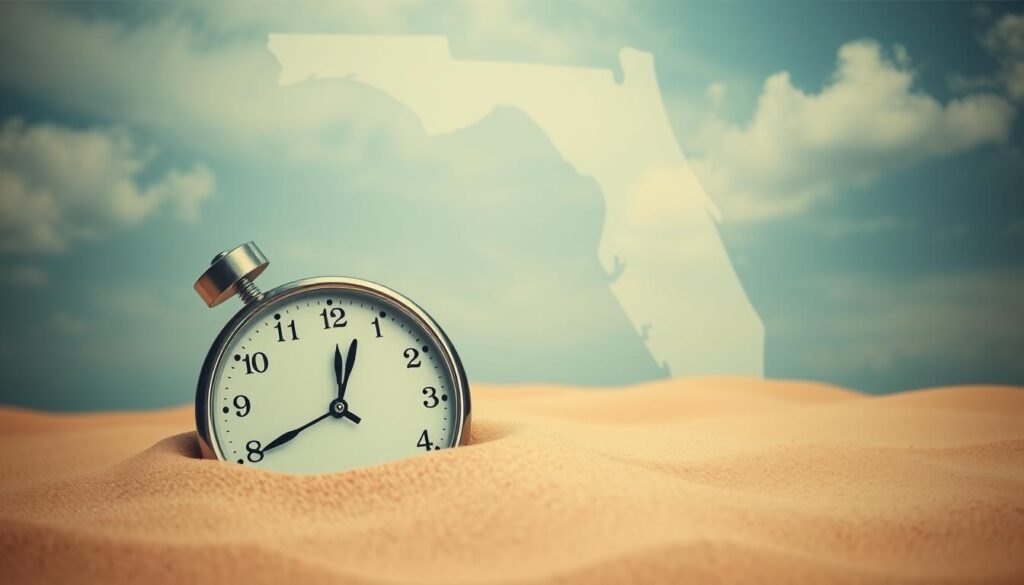Florida’s debt collection laws can be tricky to understand. Knowing the state’s statutes of limitations can protect consumers. These laws set time limits for creditors to pursue different types of debt.
The article covers deadlines for recovering various debts in Florida. It explains consumer and creditor rights and obligations. It also discusses strategies used by debt collectors.
Factors like partial payments can affect when the limitations period starts. It’s crucial to assert the statute of limitations defense to protect your finances. Understanding these laws helps consumers make better decisions about debt management.
Legal professionals can guide you through debt-related issues. They can help you find resources for responsible debt management. With this knowledge, you can handle your debt with more confidence.
Key Takeaways
- Florida has specific statutes of limitations that govern the time frame for creditors to pursue different types of debt.
- Consumers have rights and protections under Florida’s debt collection laws, including the ability to assert the statute of limitations defense.
- Partial payments and acknowledgments can impact the start of the limitations period, potentially restarting the clock for debt collection efforts.
- Understanding the nuances of Florida’s debt recovery regulations can help consumers make informed decisions and protect their financial well-being.
- Consulting legal professionals can be invaluable in navigating the complexities of debt-related issues and pursuing the most favorable outcomes.
Understanding Florida’s Debt Collection Laws
Florida’s debt management laws are complex and important. The florida debt statute limitations, florida consumer debt laws, and florida creditor laws debt shape debtor and creditor rights.
Statutes Governing Consumer Debt
Florida’s laws create a legal framework for consumer debt. These statutes cover various aspects of debt management.
- Debt collection practices
- Debt-related disclosures and notifications
- Debt settlement and negotiation procedures
- Statute of limitations for different debt types
Creditor Rights and Obligations
Creditors in Florida must follow specific rules when collecting debts. These rules protect consumers from unfair practices.
- Restrictions on harassment and abusive tactics
- Requirements for proper documentation and validation of debts
- Limitations on the types of fees and interest that can be charged
- Procedures for handling consumer disputes and complaints
Understanding florida creditor laws debt helps both consumers and creditors. It allows for better navigation of the debt collection process.
This knowledge can help avoid potential legal issues. It ensures fair practices in debt collection.
“Keeping up with florida consumer debt laws is vital. It helps debtors and creditors stay within legal boundaries.”
Statute of Limitations: The Time Factor
The statute of limitations is vital in debt collection. It sets a time limit for creditors to take legal action on a florida debt time limits. This timeframe is key for both debtors and creditors in Florida.
This statute protects debtors from endless legal pursuit. The time limit varies by debt type. It gives a clear window for resolving debts before they become time-barred.
Understanding these deadlines helps debtors manage their finances better. It also allows them to prepare for possible legal challenges.
The Importance of Time
The statute of limitations affects both creditors and debtors. For creditors, it creates urgency to recover outstanding florida limitations period debt. If they don’t act in time, the debt may become unenforceable.
For debtors, it offers protection against ongoing collection efforts. Knowing the florida debt time limits helps debtors plan their finances. It also guides their response to any legal actions by creditors.
| Debt Type | Statute of Limitations (Years) |
|---|---|
| Credit Card Debt | 5 |
| Personal Loans | 5 |
| Mortgages | 5 |
| Medical Debt | 5 |
This table shows florida limitations period debt for common debts. Note that specific time limits may vary. Factors like debt nature and collection circumstances can affect these limits.

Understanding the statute of limitations is crucial for managing debt in Florida. It helps both debtors and creditors make smart choices. They can use this knowledge to develop effective legal strategies for handling florida debt time limits.
florida statutes of limitations debt
Florida’s debt collection laws set time limits for creditors to pursue legal action. These time limits are crucial for both debtors and creditors. They affect rights and obligations in debt collection cases.
The state’s debt statutes vary by debt type. Generally, the time limit for most consumer debts is five years. This includes credit card debt and personal loans. The clock starts from the last payment or account activity.
| Debt Type | Statute of Limitations |
|---|---|
| Credit Card Debt | 5 years |
| Personal Loans | 5 years |
| Promissory Notes | 5 years |
| Open Accounts | 4 years |
| Retail Installment Contracts | 4 years |
The statute of limitations clock resets with any payment or debt acknowledgment. This can extend the time for a creditor to take legal action. It’s crucial to understand this aspect of debt collection.
“Understanding the florida statutes of limitations debt is crucial for both debtors and creditors in navigating the complex world of debt collection.”
Florida’s debt collection laws can be complex. Staying informed helps protect your rights and obligations. Consider seeking legal advice to ensure compliance and avoid potential issues with time-barred debt.
Debt Types and Their Time Limits
Florida’s debt recovery laws are complex. Different types of debt have unique statutes of limitations. Creditors must understand these florida debt claim deadlines, florida debt recovery rules, and florida debt pursuit regulations to navigate legal processes effectively.
Credit Card Debt Limitations
In Florida, credit card debt has a five-year statute of limitations. This period starts from the last account activity, like a payment or charge. After five years, the debt becomes time-barred.
Creditors may struggle to collect outstanding amounts once this deadline passes. It’s crucial to act within this timeframe to maintain legal recourse.
Personal Loan Debt Deadlines
Personal loan debt in Florida also has a five-year statute of limitations. This applies to unsecured loans from banks or other financial institutions. Creditors must take action within this period to recover the debt.
Failing to act within the allotted time can result in lost legal options. It’s essential to track these deadlines carefully.
| Debt Type | Statute of Limitations in Florida |
|---|---|
| Credit Card Debt | 5 years |
| Personal Loan Debt | 5 years |

Understanding these florida debt claim deadlines, florida debt recovery rules, and florida debt pursuit regulations is vital. Both creditors and consumers should know their rights and obligations in debt-related matters.
Calculating the Clock’s Start
Knowing when the statute of limitations clock starts is vital for florida debt time limits. In Florida, it typically begins on the last debt activity date. However, pinpointing the exact start can be tricky due to various factors.
The type of debt matters. For credit cards, the clock starts with the last payment or account activity. Personal loans begin on the last payment or default date.
Some situations can affect the start time. If a debt is charged off or sold, the clock may reset. Written acknowledgment or partial payment can extend or restart the period.
| Debt Type | Limitations Period Start |
|---|---|
| Credit Card Debt | Last payment or activity on account |
| Personal Loan | Date of last payment or default |
| Charged-Off or Sold Debt | May reset the limitations period |
| Acknowledged or Partial Payment | May extend or restart the limitations period |
Accurately determining the florida debt time limits clock start is crucial. It helps both consumers and creditors understand their rights. Staying informed on these details allows for better debt management decisions.
Impact of Partial Payments and Acknowledgments
Grasping the complexities of florida debt statute limitations is vital for consumers and creditors alike. Partial payments and acknowledgments can significantly affect the statute of limitations period. These factors play a crucial role in debt management.
Restarting the Limitations Period
In Florida, partial debt payments or written acknowledgments can restart the limitations period. This reset gives creditors more time to pursue outstanding balances. The clock starts ticking anew, extending the creditor’s window for action.
This rule stems from the debtor’s affirmation of the debt’s validity. By making a payment or acknowledging the debt, they reaffirm their repayment obligation. Such actions can be seen as a voluntary restart of the statute of limitations.
The specifics of each case can affect whether the limitations period restarts. Seeking advice from a legal expert in florida debt statute limitations is wise. They can help navigate the complexities of each unique situation.
“Partial payments and acknowledgments can significantly impact the statute of limitations, so it’s crucial for both consumers and creditors to understand the implications.”
The impact of payments and acknowledgments on florida debt statute limitations is complex. It demands careful consideration from all parties involved. Staying informed helps protect legal rights and supports sound decision-making.

| Debt Type | Statute of Limitations | Partial Payment Impact | Acknowledgment Impact |
|---|---|---|---|
| Credit Card Debt | 5 years | Can restart the clock | Can restart the clock |
| Personal Loan | 5 years | Can restart the clock | Can restart the clock |
| Promissory Note | 5 years | Can restart the clock | Can restart the clock |
Creditor Strategies and Tactics
Florida creditors use various strategies to recover outstanding debts. Knowing these approaches helps consumers protect their rights. The florida debt recovery rules and florida debt pursuit regulations outline the legal framework for creditor-debtor interactions.
Creditors in Florida may use several tactics to collect on delinquent accounts. These can include:
- Repeated phone calls and written communications to the debtor
- Negotiation of payment plans or settlement agreements
- Reporting the debt to credit bureaus, which can negatively impact the debtor’s credit score
- Pursuing legal action, such as filing a lawsuit or obtaining a court judgment
- Garnishing wages or seizing assets, subject to applicable exemptions
Consumers should know their rights and the limits on creditors’ actions. The florida debt pursuit regulations require creditors to follow specific guidelines when communicating with debtors.
These rules forbid harassment, threats, or misleading statements. Creditors must balance assertive debt pursuit with respecting consumer rights.
“Creditors must strike a delicate balance between assertively pursuing outstanding debts and respecting the rights of consumers.”
Understanding florida debt recovery rules requires vigilance and sometimes legal help. Knowing creditor strategies helps consumers make informed decisions and defend their interests effectively.
Defending Against Time-Barred Debt
Understanding florida debt statute limitations is vital for protecting yourself from unlawful debt collection. This legal tool can shield you from old debts that are no longer enforceable.
Asserting the Statute of Limitations Defense
Consumers can use the statute of limitations defense when creditors try to collect on expired debts. This defense stops creditors from taking legal action if the time limit has passed.
To use this defense effectively, follow these steps:
- Determine the applicable statute of limitations for the type of debt in question, as outlined in Florida’s debt collection laws.
- Calculate the time elapsed since the debt became due, taking into account any factors that may have paused or restarted the limitations period.
- Notify the creditor in writing that the debt is time-barred and that any further collection efforts will be viewed as a violation of the law.
Taking these steps can help you protect yourself from old debts. You can use florida debt statute limitations to fight against collection of expired debts.
“The statute of limitations defense is a powerful tool in the fight against unlawful debt collection practices. It’s essential for consumers to understand their rights and how to properly assert this defense.”
Dealing with florida debt statute limitations can be tricky, but knowing your rights is crucial. By using the statute of limitations defense, you can protect your finances.
Stand up against unfair collection tactics and safeguard your financial well-being. With the right knowledge, you can effectively defend yourself against time-barred debt.
Consequences of Ignoring Time Limits
Ignoring florida debt time limits can lead to serious problems for consumers and creditors. These legal guidelines are crucial for financial well-being. Failing to follow them can cause financial and legal challenges.
Consumers who disregard the statute of limitations may face aggressive debt collection tactics. These can include wage garnishment, bank account seizures, and legal action. Creditors might try to revive old debts, causing stress and potential financial ruin.
Creditors who pursue expired debts risk legal consequences. They could face lawsuits, fines, and criminal charges for unlawful practices. This can result in financial losses and damage to their reputation.
- Consumers may face wage garnishment, bank account seizures, and legal action.
- Creditors may face lawsuits, fines, and criminal charges for pursuing time-barred debts.
- Ignoring florida debt time limits can have lasting financial and legal consequences.
“Understanding and respecting the florida debt time limits is crucial for both consumers and creditors. Failure to do so can result in a costly and potentially devastating outcome.”
Both consumers and creditors should know the florida debt time limits. It’s vital to act within the law. Staying informed helps protect financial interests and avoid serious consequences.
Florida Debt Collection Practices Act
Florida’s Debt Collection Practices Act protects consumers from unfair debt collection practices. It sets rules for debt collectors and provides remedies for those facing harassment. The Act ensures Florida residents’ rights are protected when dealing with outstanding debts.
Consumer Protections and Remedies
The Florida Debt Collection Practices Act offers several key consumer protections. These safeguards help maintain fair and ethical debt collection practices in the state.
- Prohibiting debt collectors from using abusive, deceptive, or unfair tactics to collect debts
- Limiting the hours during which debt collectors can contact consumers
- Requiring debt collectors to verify the validity of a debt before attempting to collect it
- Allowing consumers to dispute the validity of a debt and request validation from the collector
- Providing consumers with the right to sue debt collectors who violate the Act’s provisions
Consumers can seek compensation if debt collectors violate their rights under this Act. They may recover actual damages, statutory damages, and attorney’s fees. This protection is crucial in florida consumer debt laws and florida creditor laws debt.
| Key Protections Under the Florida Debt Collection Practices Act | Remedy for Consumers |
|---|---|
| Prohibiting abusive, deceptive, or unfair debt collection tactics | Actual damages, statutory damages, and attorney’s fees |
| Limiting the hours during which debt collectors can contact consumers | Actual damages, statutory damages, and attorney’s fees |
| Requiring debt collectors to verify the validity of a debt before attempting to collect it | Actual damages, statutory damages, and attorney’s fees |
| Allowing consumers to dispute the validity of a debt and request validation | Actual damages, statutory damages, and attorney’s fees |
Knowing your rights under florida consumer debt laws and florida creditor laws debt is crucial. This knowledge helps Florida consumers navigate debt collection processes effectively. It also protects them from unlawful practices by debt collectors.

Consulting Legal Professionals
Legal experts can guide you through florida debt statute limitations. They help consumers and creditors understand their rights and obligations. Attorneys ensure compliance with Florida’s debt collection laws.
Lawyers can interpret florida debt statute limitations for consumers facing debt issues. They assess debt validity and develop strategies against unfair practices. Legal pros also assist with negotiations and settlements.
For creditors, attorneys ensure compliance with state regulations. They navigate florida debt statute limitations and create effective collection strategies. Legal counsel represents creditors in court proceedings.
Legal advice is crucial for complex debt situations. It protects the rights of all parties involved. Both consumers and creditors benefit from professional guidance.
| Reason for Consulting a Legal Professional | Benefits for Consumers | Benefits for Creditors |
|---|---|---|
| Interpreting florida debt statute limitations | Understand rights and obligations | Ensure compliance with regulations |
| Assessing the validity of debt | Develop strategies to defend against time-barred or unfair collection practices | Navigate the florida debt statute limitations effectively |
| Negotiating settlements and disputes | Obtain favorable outcomes | Devise effective collection strategies |
| Representing in court proceedings | Receive expert guidance and representation | Obtain expert legal counsel and representation |
Legal professionals help navigate florida debt statute limitations confidently. They ensure the best outcomes for both consumers and creditors.
Managing Debt Responsibly
Dealing with debt in Florida requires a smart approach. Know your rights and duties as a consumer. Several options can help you address debts while protecting your interests.
Negotiation and Settlement Options
Explore all ways to reach a fair solution for your debt. This includes talking with creditors and looking into debt settlement. Understanding florida debt recovery rules helps you make wise choices.
Debt consolidation programs can also be helpful. They may simplify payments and lower interest rates. This option can be useful when considering florida debt time limits.
- Negotiate with creditors: Discuss payment plans, lower interest rates, or lump-sum settlements. Creditors often want to find a solution that works for both parties.
- Explore debt settlement: Companies can negotiate with creditors for you. They might reduce your total debt. Be careful of scams and research providers thoroughly.
- Consider debt consolidation: Combine multiple debts into one loan. This can make payments easier and possibly lower your interest rates.
Always document talks with creditors. This helps protect your rights against unfair collection practices. Keep records of all communications and agreements.
| Negotiation Tactic | Potential Benefits | Considerations |
|---|---|---|
| Payment Plan Negotiation | Reduced monthly payments, lower interest rates | Requires ongoing communication and adherence to the plan |
| Lump-Sum Settlement | Reduced total debt owed, faster resolution | Requires access to a lump-sum payment, potential tax implications |
| Debt Consolidation | Simplified payments, potentially lower interest rates | Requires qualifying for a new loan, may extend the repayment timeline |
Learn about florida debt recovery rules to manage your debt wisely. Take action to improve your financial future. Stay informed and explore your options.
Credit Reporting and Debt Recovery
Credit reporting and debt recovery are vital in Florida’s financial landscape. Creditors must balance pursuing payments with following credit reporting rules. These practices affect both lenders and borrowers alike.
The florida debt pursuit regulations guide how credit info is reported during debt recovery. Understanding these rules is key for protecting financial interests. Both creditors and consumers need this knowledge.
Impact of Credit Reporting on Debt Collection
Creditors use credit reports to recover florida debt. Negative info can hurt a person’s chances of getting loans or jobs. However, creditors must report accurate and timely information.
Navigating the Regulatory Landscape
- The Florida Debt Collection Practices Act protects consumers. It limits what info can go to credit bureaus.
- Creditors must be careful when reporting debt info. Wrong details can lead to legal and financial trouble.
- Consumers can dispute wrong info on their credit reports. This may remove florida debt pursuit regulations that don’t match their history.
Knowing credit reporting and debt recovery rules helps everyone in Florida. It ensures fair practices and protects financial well-being. Both creditors and consumers benefit from this understanding.
| Debt Type | Statute of Limitations | Credit Reporting Impact |
|---|---|---|
| Credit Card Debt | 5 years | Negative information can remain on credit report for up to 7 years |
| Personal Loans | 5 years | Unpaid loans can be reported to credit bureaus for up to 7 years |
| Medical Debt | 5 years | Unpaid medical bills may be reported to credit agencies |
“Responsible credit management and understanding the interplay between debt collection and credit reporting are crucial for maintaining financial stability in Florida.”
Staying Informed on Legislative Changes
Keeping up with florida debt statute limitations, florida consumer debt laws, and florida creditor laws debt is crucial. The legal landscape for debt collection is always changing. Consumers and creditors must stay alert to these shifts.
New laws can greatly impact your rights and duties. For example, Florida might pass stricter debt collection rules. These could change florida debt statute limitations or boost consumer protections.
Not staying informed could lead to legal issues or penalties. Subscribe to legal updates covering florida consumer debt laws and florida creditor laws debt. Regular talks with lawyers can also help you navigate these changes.
| Key Updates to Monitor | Potential Impact |
|---|---|
| Changes to florida debt statute limitations | Affect the timeline for debt collection and creditor actions |
| Amendments to florida consumer debt laws | Enhance or expand consumer protections |
| Revisions to florida creditor laws debt | Alter creditor rights and obligations in debt collection |
Staying informed helps align your actions with current laws. This reduces the risk of costly disputes or legal troubles. A proactive approach to understanding these laws is key.
It allows you to navigate debt management and collection with confidence. Embrace this strategy to stay ahead in the complex world of debt laws.
Conclusion
This article has covered Florida’s statutes of limitations for debt. It explains time limits for creditors, consumer protections, and strategies for old debts. Understanding the legal framework and their rights helps consumers and creditors make informed decisions.
Florida’s debt collection laws can be complex. This guide highlights critical deadlines, creditor obligations, and consumer safeguards. Staying informed about state debt statute limitations is crucial for both debtors and creditors.
Knowledge of Florida debt laws promotes responsible financial practices. It encourages timely debt resolution and balanced debt collection. Staying informed is key to navigating Florida’s debt statutes of limitations successfully.

